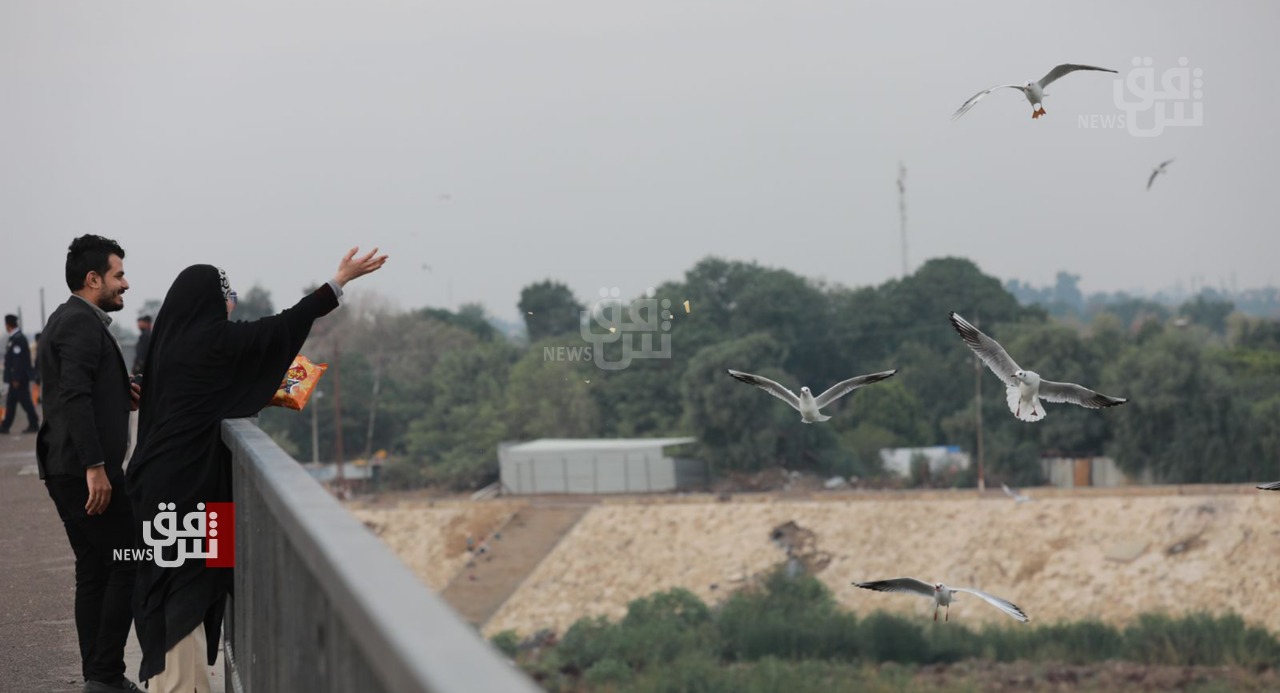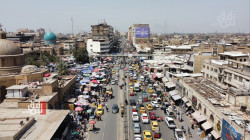2023: hope is on the way after a turbulent year for Iraq

Shafaq News / Countless events dominated the Iraqi arena in 2022, the most prominent of which was the formation of a new government headed by Mohammed Shia al-Sudani.
As we approach 2023, the concern that recurs every year arises again: Will Iraq witness the desired stability given the magnitude of the crises that have not yet been resolved?
January
After the elections, on the ninth of the month, the oldest speaker of the parliament, Mahmoud al-Mashhadani, opened the first session of the new parliament. Mohammed al-Halboosi was then re-elected as speaker of the new parliament despite ongoing political disagreements over the largest parliamentary bloc that has the right to choose the prime minister.
On the 25th of the same month, the formation of a new Sunni political alliance named al-Siyada was announced. It was the fruit of an alliance between the Takaddom party led by al-Halboosi and the Azm alliance headed by Khamis al-Khanjar.
February
On February 3rd, the Supreme Court set the required quorum for the House of Representatives present members during the presidential election session and decided to exclude Hoshyar Zebari from the post after he was subjected to accusations and lawsuits of corruption by political blocs.
On the 17th of the same month, a new political alliance named "Saving the Homeland" was launched, which included the Sadrist Movement, the Siyada Alliance, and the Kurdistan Democratic Party (K.D.P.), in an attempt to form the new government, with 183 parliamentary seats out of 329.
March
On the 23rd of the month, the Sadrist movement nominated Iraq's ambassador in London, Muhammad Jaafar al-Sadr for president, while the K.D.P. nominated Rebar Ahmed for the post.
Because the trilateral alliance was unable to round up 220 deputies on March 26, the House of Representatives was unable to reach the necessary quorum for its session to vote on presidential candidates.
The Coordination Framework was given 40 days by the Sadrist leader on March 31 to create a government, and allowed its allies to consult with the Framework during that time.
Additionally, the price of food has increased in Iraq, particularly for flour and vegetable oil, which the government attributed to the conflict in Ukraine.
April
On the eighth of this month, the leader of the National Wisdom Movement, which is part of the Coordination Framework, presented an unsuccessful political initiative due to the Sadrist movement's refusal to return to what they described at the time as "quota governments."
On the other hand, a string of incidents occurred in southern Iraq, where offices and mosques belonging to the cleric Mahmoud al-Sarkhi were attacked because he issued fatwas and religious declarations that contradict Shiite beliefs. What sparked the incidents was the delivery of a sermon by one of his followers on the eighth of the month in which he called for the destruction of Shiite imams' shrines.
May
The Coordination Framework announced a plan to break the political deadlock on the fourth of this month. On May 9, the framework's 40-day window to create a government—given to it by the Sadrist movement—expired without success.
Iraq also experienced dust storms, which compelled the closure of airports, schools, universities, and public institutions in several of the country's governorates, including the capital Baghdad, and resulted in the death of several people and the suffocation of thousands more.
Also this month, Saad al-Mjarred's concert was canceled in the Sinbad Land in Baghdad after protests against it.
June
On the 13th of the month, the Sadrist movement announced the withdrawal of its deputies from parliament, and al-Sadr rejected an initiative to persuade him to revoke the resignation of his deputies.
The House of Representatives witnessed the swearing-in of new lawmakers on the 23rd of the same month, replacing the Sadrist deputies and elevating the Coordination framework to the position of the largest parliamentary bloc.
The Coordination Framework declared MP Mohammed Shia al-Sudani's candidacy for prime minister on the 25th of the same month, and two days later, supporters of the Sadrist movement stormed the parliament building inside the Green Zone in protest.
July
As Sadrist supporters besieged the presidential palace on the 28th and 29th of the month, deadly skirmishes between armed groups broke out inside the Green Zone, leading to numerous deaths and injuries. Parliament Speaker Mohammed al-Halboosi, therefore, postponed parliamentary sessions until further notice.
Furthermore, the Coordination Framework called on its followers to stage anti-Sadrist protests around the Green Zone on the 31st of the month.
Amid this political crisis, an Iraqi journalist based in the United States of America named Ali Fadhel released audio recordings attributed to the head of the State of Law Coalition, Nouri al-Maliki, in which he attacked Shiite forces, especially the Sadrist movement and its leader Muqtada al-Sadr.
The same month also witnessed a bombing targeting Duhok and killing civilian tourists. Iraq accused Turkey, which for its part denied the attack and accused the Kurdistan Workers Party (P.K.K) of being behind it, accompanied by demonstrations, protests, and calls for the government to respond to the bombing.
August
This month, Muqtada al-Sadr announced his permanent retirement from political action after religious authority Kadhem al-Ha'eri resigned and urged his followers to start obeying Ali Khamenei. Sadrist supporters left the Green Zone as per their leader's orders to do so.
Images of the wife of the Iraqi ambassador to Jordan with artist Ragheb Alama have taken over the headlines in Iraq coupled with the continued escalation of the political crisis.
Also, the "Qattarat Imam Ali" shrine in Karbala collapsed at the month's end, trapping many people inside the wreckage. Six persons were saved after two nights of search efforts, while seven more were deceased.
September
The Supreme Court rejected the lawsuit to dissolve the Iraqi parliament, on September 7, after it was submitted by a group of deputies and activists, and on the 28th of the month, the Iraqi parliament rejected the resignation of its president two days after he submitted it.
On the 28th of the same month, the Coordination Framework announced the formation of the State Administration Coalition, which included Shiite, Sunni, and Kurdish forces, except for the Sadrist movement.
In addition to the escalation of the movement of political forces that broke the political stalemate, "Tik Tok" influencer and dancer Marwa al-Qaisi's suicide in Erbil, as well as the killing of Zainab Essam after she was shot in her home near the shooting range of a military base west of Baghdad were some of the shocking events this month.
The month also witnessed a case of harassment of a girl in the Karrada area by a passenger on a public transport bus, who later turned out to be a member of the federal police.
The Iranian bombing of Erbil came as a tragic end to this month. It resulted in 71 casualties and injuries.
October
On the third anniversary of the Tishreen (October) Revolution, thousands of people protested in central Baghdad at the beginning of this month, calling for an end to corruption. Protesters and security personnel clashed as the latter attempted to block the entrances to the capital's Green Zone.
The House of Representatives session was called in the same month, the Presidency of the Republic and the Council of Ministers were elected, and the "political stalemate" was broken. However, at the month's end, a financial corruption scandal involving the theft of tax secretariats—dubbed the "theft of the century"—emerged.
November
At the beginning of this month, talk of blocking pornographic websites returned to the fore again, as the Minister of Communications Hiam al-Yasiri directed the blocking of pornographic sites in Iraq, sparking uproar on social media.
This coincided with the Iraqi parliament's quest to legislate the flag service law, to end this controversy after it was withdrawn by a decision by Prime Minister Mohammed Shia al-Sudani.
A fuel tank explosion in the Duhok governorate resulted in the death of five persons and the injury of 40 more, bringing this month's events to a devastating conclusion.
December
A picture of a delivery man expressing shock and disappointment after his motorcycle was stolen while he was praying in an Erbil mosque this month sparked widespread discussion.
Furthermore, as Iraq recently marked the fifth anniversary of the declaration of victory over the terrorist group ISIS on December 10, 2017, this month's killings were also not spared. On Sunday, one of ISIS's largest operations of the year took place in Iraq, in which at least seven members of the Iraqi security forces, including a major officer, were killed and three others were injured in an attack on a vehicle carrying them in Kirkuk.





